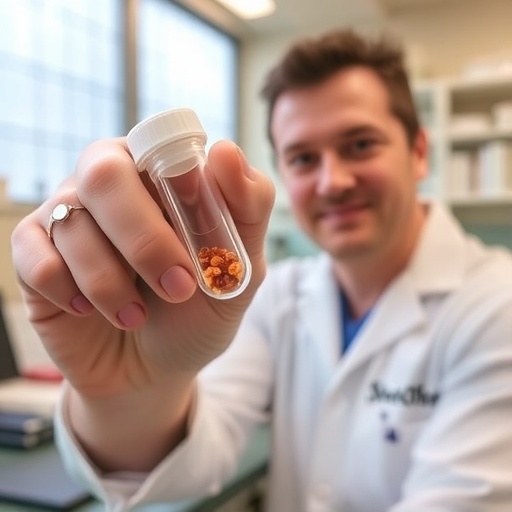
In a groundbreaking development promising to reshape therapeutic strategies for autoimmune diseases, Tianfu Wu, an associate professor of biomedical engineering at the University of Houston, has embarked on pioneering research supported by a $1 million Impact Award from the U.S. Department of Defense. This initiative focuses on delivering targeted medication directly to the spleen, an organ increasingly recognized for its central role in the pathogenesis of systemic lupus erythematosus (SLE), commonly known as lupus. Wu’s approach utilizes intricately engineered lipid nanoparticles to achieve precision drug delivery, potentially revolutionizing treatment paradigms for this complex autoimmune condition.
Lupus is a chronic autoimmune disease characterized by dysregulated immune responses that lead to widespread inflammation and tissue damage. Patients endure persistent disease activity, unpredictable flare-ups, and an increased susceptibility to infections, often exacerbated by the broad immunosuppressive therapies currently in use. These conventional treatments, while alleviating symptoms, inadvertently compromise overall immune competency, resulting in a delicate balance between managing autoimmunity and preserving immune defenses.
The spleen, traditionally acknowledged as a blood filter and a reservoir for immune cells, has garnered attention for its nuanced role in immune regulation, especially concerning lupus. Housing a diverse population of lymphocytes including B cells, plasmacytoid dendritic cells, and macrophages, the spleen serves as a critical hub where aberrant immune activation can precipitate systemic inflammation. Wu’s research capitalizes on this biological insight by devising a spleen-specific drug delivery system capable of concentrating therapeutic agents within this organ, thus modulating autoimmune activity at its presumed origin.
.adsslot_9vOCcZVoSR{width:728px !important;height:90px !important;}
@media(max-width:1199px){ .adsslot_9vOCcZVoSR{width:468px !important;height:60px !important;}
}
@media(max-width:767px){ .adsslot_9vOCcZVoSR{width:320px !important;height:50px !important;}
}
ADVERTISEMENT
Central to Wu’s methodology is the construction of lipid nanoparticles adorned with mannose, a naturally occurring sugar molecule. These mannose-modified nanoparticles exhibit high affinity for mannose receptors prevalently expressed on key splenic immune cells implicated in lupus. This targeting strategy not only enhances the uptake of therapeutic compounds by pathological immune subsets but also mitigates off-target systemic exposure, potentially minimizing the adverse effects commonly associated with generalized immunosuppression.
The importance of developing organ-specific interventions becomes clear when juxtaposing the spleen’s immunological role with that of end-organs typically afflicted by lupus, such as the kidneys, heart, and central nervous system. Wu’s approach recognizes the divergent functions of similar immune targets across different tissues, advocating for precision medicine that tailors drug distribution to the microenvironment of each organ involved in autoimmune pathology. This specificity could prevent the deleterious consequences of systemic immune modulation and preserve beneficial immune functions elsewhere in the body.
Traditional lupus therapeutics often encompass systemic immunosuppressants or broad B-cell depletion strategies, which, despite their efficacy in dampening autoimmune responses, carry substantial risks including increased infections and the loss of protective immune cell subsets. Wu emphasizes the urgent demand for technologies that refine immune modulation—targeting pathological cellular players without compromising global immunity. His spleen-specific delivery platform aspires to fulfill this unmet need by precisely attenuating the inflammatory impetus within the spleen’s microenvironment.
Utilizing lipid nanoparticles as a vehicle for drug delivery merges the realms of nanotechnology and immunology, offering several advantages. These nanocarriers possess favorable biocompatibility, the capacity for controlled release, and the adaptability to be decorated with targeting ligands such as mannose. By optimizing physicochemical properties and surface chemistry, Wu’s team is able to direct these nanoparticles selectively to specific immune cells, thereby increasing therapeutic index and reducing systemic toxicity.
The mannose receptor-mediated uptake mechanism employed in the system is particularly noteworthy. Mannose receptors are C-type lectin proteins that recognize carbohydrate motifs on pathogens and endogenous glycoproteins, mediating endocytosis and antigen presentation. Leveraging this natural cellular pathway facilitates efficient internalization of nanoparticles by macrophages, dendritic cells, and B cells within the spleen, making mannose an ideal targeting moiety for immune modulation in lupus.
This research not only signifies a potential milestone in treating lupus but also provides a valuable platform for investigating the molecular and cellular dynamics underpinning disease progression. By concentrating therapeutics in the spleen, scientists can observe alterations in immune cell behavior and signaling, gaining insights into how lupus initiates and propagates. Such knowledge could illuminate new molecular targets amenable to therapeutic intervention beyond the scope of current treatments.
Wu’s endeavor is among the first to conceptualize and implement a spleen-specific organ-targeted drug delivery system in lupus models. This pioneering effort lays the foundation for subsequent innovations that harness organ tropism to refine treatment modalities for autoimmune and inflammatory disorders. The translational implications are profound, opening avenues to develop therapies with improved efficacy and safety profiles tailored to individual organ systems.
The broader scientific community has often grappled with the challenge of balancing immune suppression with preservation of host defenses. Wu’s precision targeting paradigm shifts this narrative by highlighting the feasibility of organ-level selective modulation, offering hope for autoimmune patients who have historically contended with suboptimal treatments. If successful, this strategy could serve as a blueprint for managing other autoimmune diseases where organs harbor distinct immune landscapes contributing to pathology.
In conclusion, Tianfu Wu’s research embodies an innovative intersection of nanomedicine, immunology, and targeted therapy that stands to revolutionize lupus treatment. The development of mannose-modified lipid nanoparticles engineered for spleen-specific delivery portends a future where autoimmune diseases can be treated with unprecedented specificity and minimized systemic risk. As this research advances toward clinical translation, it holds the promise of not only improving patient outcomes but also ushering in a new era of organ-centric therapeutic design.
Subject of Research: Lupus (Systemic Lupus Erythematosus) and organ-specific drug delivery targeting the spleen
Article Title: [Not provided]
News Publication Date: [Not provided]
Web References: [Not provided]
References: [Not provided]
Image Credits: University of Houston
Keywords: Lupus, Autoimmune disorders, Diseases and disorders, Inflammatory disorders, Leukocytosis, Human health
Tags: advanced therapeutic strategies for lupusautoimmune disease researchchronic autoimmune disease managementimmunosuppressive therapies challengeslipid nanoparticles in medicinelupus treatment innovationprecision drug delivery technologyspleen’s role in lupussystemic lupus erythematosus therapytargeted medication deliveryTianfu Wu biomedical engineeringUniversity of Houston drug delivery system





